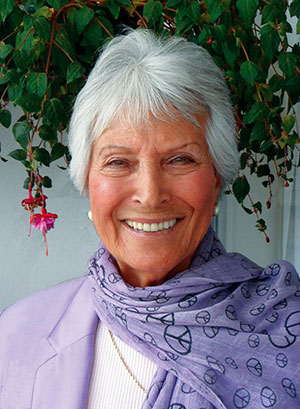‘Under the Ginkgo Tree’ Is a Fast-Paced, Engrossing Tale
Jolene DeLisa’s Memoir Is a Fast-Paced, Engrossing Tale

Haven’t you ever thought, “My life story would make a great book”? Well, Jolene DeLisa did; not only has she experienced enough adventure to fill a book, but she has also written that book, titled Under the Ginkgo Tree: A Memoir. The autobiography is a fast-paced, engrossing tale of her life: from her upbringing as an orphaned child of a teenage mother and the racism she encountered growing up in New Zealand (DeLisa is half Māori) to being a young woman in the Hollywood scene in the 1950s and her later devotion to the peace movement.
Under the Ginkgo Tree chronicles tragedy — her son, Kirk, died in a helicopter accident in 1991— and triumphs — she marched all the way across the United States in 1986 and went to Russia with a peace group in 1987. Living in Santa Barbara for more than a decade, DeLisa has soldiered on in the quest for peace, working in numerous political campaigns and working to stop gun violence. On the 10th anniversary of Kirk’s death, she planted a Peace Pole at La Casa de Maria in Santa Barbara. DeLisa, at 87 years old, still spends time promoting peace; last spring she spoke to a class at Santa Barbara High School about her experiences around the world. I recently spoke over the phone with DeLisa about some of the highlights of her peripatetic life.
In Hollywood, you were considered beautiful and exotic, with your dark skin and blue eyes. Was it the same growing up in New Zealand? When I was growing up, I remember distinctly being called a “dirty Māori.” I would try to scrub my skin to make it lighter.
In the 1950s, there were few social or legal structures in place for women who had been mistreated. That changed radically in the 1960s, with the various women’s movements. How do you think women are doing these days? A lot has changed for women, although the ERA [Equal Rights Amendment] still has not been passed. Making 77 cents on the dollar for the same work men are doing, the efforts to recriminalize abortion — those are backwards steps. I think women have thought we were moving forward, but in some ways we’ve taken steps back.
For example? Some of the gains that women seek today don’t seem like gains to me. I don’t understand women wanting to be in the military. The sad thing is they think that’s a step forward, yet they leave their own children to kill others’ children. That’s totally beyond me. But women do simply amaze me, too, at what they can do. They are the nurturers of the world. They care for men and children.
On Mother’s Day 2000, you joined about three quarters of a million others in the Million Mom March to promote tighter gun controls. How is the U.S. doing on that? We’re so far behind. We keep building more prisons, we keep the death penalty, and yet we don’t change the laws about guns. It’s true that other countries think we’re crazy, with all our guns.
Do you think that all your efforts, and those of others, have made a difference? I do. We have to have faith and know that this — gun violence—is going to change at some time because the young are counting on this.
You’ve spoken to students at Santa Barbara High School about your experiences. What kind of reception did you get? There were 31 students listening to this old woman, nothing on their desks except pencils and paper. Their backpacks were under the seat; there were no little machines. I was blown away. I got a thank-you card from them, and I’m going back in the fall.
You’ve done so much trying to make a peaceful world for our children. Do you think there’s hope? Here are the words I’d like to leave with you. I believe that the Dalai Lama has it correctly — we must love one another. The faith of knowing that all I’ve got is this one vehicle, this tired old body, my mind still very sharp. It’ll go soon. But I have very strong faith, and I believe, like His Holiness the Dalai Lama, that love is what will save us.



